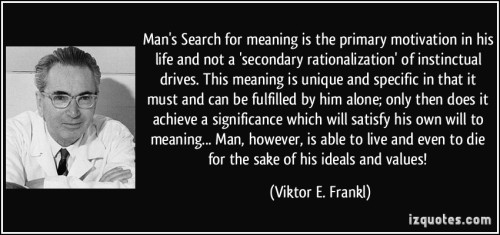2011 (1)
2016 (1035)
2017 (752)
2018 (978)
2019 (385)
2020 (175)
2021 (235)
2022 (101)
2023 (983)
2024 (800)

Logotherapy was developed by neurologist and psychiatrist Viktor Frankl[1] and is based on the premise that the primary motivational force of an individual is to find a meaning in life.[2] Frankl describes it as "the Third Viennese School of Psychotherapy"[3][4] along with Freud's psychoanalysis and Adler's individual psychology.[5].


A short introduction to this system is given in Frankl's most famous book, Man's Search for Meaning (1946), in which he outlines how his theories helped him to survive his Holocaust experience and how that experience further developed and reinforced his theories.
-
Search for Meaning in Life:
- Logotherapy posits that the primary motivational force for individuals is the quest to find meaning in life.
- Life has inherent meaning under all circumstances, even in the most challenging situations.
-
Freedom and Responsibility:
- Individuals have the freedom to find meaning in their actions, experiences, and in the face of unavoidable suffering.
- Logotherapy emphasizes personal responsibility and the ability to choose one's attitude in any given circumstance.
-
Existential Analysis:
- Logotherapy is based on existential analysis, focusing on Kierkegaard's will to meaning rather than Freud's pleasure principle or Adler's will to power.
-
Spirituality without Religion:
- The human spirit, as referred to in logotherapy, is not necessarily spiritual or religious but denotes the will of the human being.
- The emphasis is on the search for meaning rather than the search for a higher power.
-
Purpose and Meaning Constructs:
- Frankl associates purpose and meaning with positive psychological functioning.
- Positive life purpose is linked to strong religious beliefs, group membership, dedication to a cause, and clear goals.
-
Discovery of Meaning:
- Meaning in life can be discovered through creating works, experiencing moments, and adopting a particular attitude toward unavoidable suffering.
- Frankl exemplifies this through a narrative involving a doctor facing the loss of his wife.
-
Overcoming Anxiety:
- Logotherapy helps individuals master anxiety by recognizing the purpose of their circumstances.
- Anxiety often results from unfulfilled responsibility and a lack of meaning.
-
Treatment Approaches:
- Logotherapy offers approaches to treat various conditions, including neurosis, depression, obsessive-compulsive disorder, schizophrenia, and terminal illness.
- Paradoxical intention, finding meaning in suffering, and transforming attitudes are key therapeutic methods.
-
Critiques and Controversies:
- Critiques include concerns about logotherapy being authoritarian and potentially undermining the complexity of human life.
- There are debates about the religious undertones of logotherapy and whether it represents a scientific psychotherapeutic school or a philosophy of life.
-
Recent Developments:
- Logotherapy has evolved, and its concepts have been integrated into other therapeutic approaches, such as cognitive behavioral therapy and acceptance and commitment therapy.
- New developments include the application of logotherapy in fields like oncology and palliative care, showcasing its continued relevance.
-
Global Impact and Institutes:
- Logotherapy has gained global recognition, with institutes established in various countries, emphasizing its widespread influence.
- Recent developments extend logotherapy's impact to new generations and diverse areas of research.




At this very moment I am reading this book "Man's Search for Meaning" by Viktor E. Frankl which is a profound and compelling memoir that offers a great deal of food for thought...